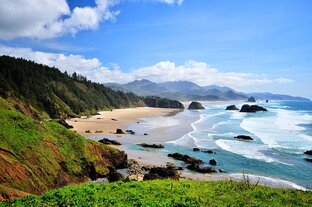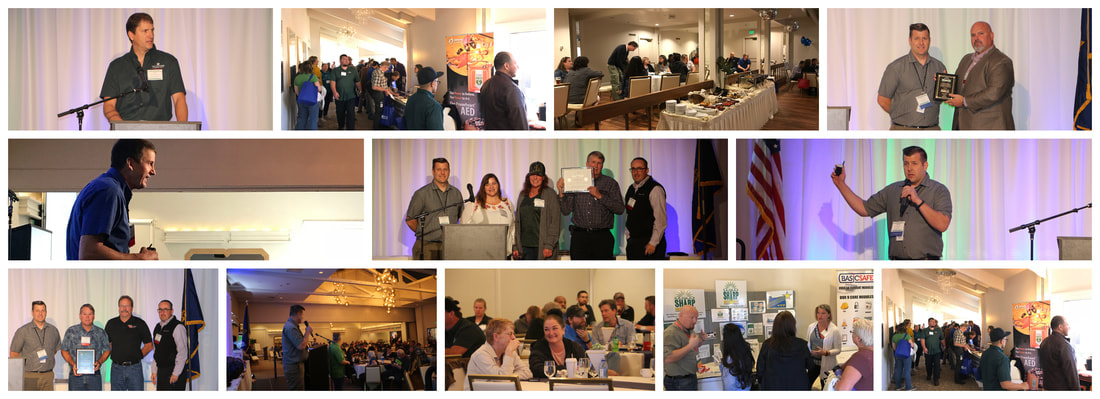| By Betsy Lewis, Internet Marketing Contractor for the Children’s Advocacy Center of Jackson County (Republished with permission. Retrieved from: http://cacjc.org/oregon-beach-safety-tips-from-someone-who-learned-the-hard-way/) |
20 years ago, when my husband, myself and our two kids were at Bandon Beach on a family vacation, I learned the hard way how dangerous beaches can be for children.
Back then, our daughter, Hailey, was six years old. At the beach, this high-spirited little girl turned into an exuberant water nymph, kicking and frolicking at the edge of the waves. She was in her element and I always breathed a sigh of relief because, finally, here was a wild energy that matched her own.
Our son, Kai, was a new walker — a sweet chubby toddler — who we had thoroughly bundled up against the elements. He was happily walking along, with stiff arms and legs, as best he could.
With so much space and a long view, we relaxed and gave the kids free rein to run around.
But when we turned around — Kai had disappeared.
We heard Hailey screaming from a short way down the beach. Next, we saw our beautiful fearless daughter plunge into a deep moat circling a large rock and fish little Kai out by his coat collar, dragging him onto the sand. He had gone in over his head – and sunk like a rock.
We ran over, bundled up our two soggy kids in beach towels and carried them up to the car. For a moment, my husband’s and my eyes met — sharing a silent terror – the grim knowledge that, had Hailey not seen Kai, we might not have found him in time.
This is not one of those stories that you laugh about later. This is the story that you don’t want to remember because it leaves you chilled to the bone with “what ifs?”
I offer this to you as a cautionary tale.
We are lucky in Southern Oregon to be able to visit and enjoy beautiful beaches so close to home. Although we don’t usually think about it, those beaches can be surprisingly dangerous. My husband and I thought we were good attentive parents, but it only took a moment on a beach for it to nearly claim our son’s life.
I have culled some Oregon Beach Safety Tips from several sources listed below for more extensive and comprehensive lists.
- Never take your eyes off children while on a beach. Supervise them closely. (A lesson I learned almost too late!)
- Beware of sneaker waves. Sneaker waves can appear suddenly without warning and they roll up onto the beach quickly and with a deadly force.
- Don’t turn your back on the ocean.
- If you see a log in the surf or on wet sand, stay clear of it. The ocean can roll a log on top of you and even tiny logs can weigh tons because they are waterlogged.
- The ocean in Oregon is normally 55 degrees Fahrenheit or colder. Wear a wet suit when swimming to avoid hypothermia, which can set in within minutes.
- If bonfires are allowed, never extinguish them by covering them with sand. Fire can smolder unseen under the sand and later beach visitors can fall through into them and burn their feet and legs.
- Avoid climbing on rocks, jetties and headlands. Tides and waves can sweep up, knock you over and carry you out to sea. Be especially careful during storms.
- Standing at the base of overhanging ocean side cliff can be dangerous because of the chance of slides and collapse. Don´t climb on bluffs and eroding hillsides.
- Know your tides. Here is a tide table website.
- Rip currents are strong currents of water that rush out to sea. They are stronger than even the best swimmer. They can sweep unwary beachcombers and waders off their feet and out to sea. Any time you see debris and foam floating out to sea, chances are you have found a rip current. Avoid the area. If caught in a rip current, don’t panic . Swim parallel to the beach until you are out of the current, then head for the beach.
Here are some resources with comprehensive beach safety tips:
Oregon Coast Visitors Association:http://visittheoregoncoast.com/beach-safety/
Oregon Parks and Recreation: State Parks:https://www.oregon.gov/OPRD/PARKS/Pages/beach_safety.aspx
American Red Cross:http://www.redcross.org/get-help/how-to-prepare-for-emergencies/types-of-emergencies/water-safety/beach-safety
Betsy Lewis


 RSS Feed
RSS Feed
